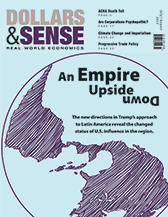The GOP’s AHCA Will Cost Lives
This article is from Dollars & Sense: Real World Economics, available at http://www.dollarsandsense.org

This article is from the
July/August 2017 issue.
Subscribe Now
at a 30% discount.
This May, the Congressional Budget Office score for the GOP’s American Health Care Act (AHCA) was released. The numbers are devastating: 23 million more Americans will lose coverage compared to maintaining the existing policy under the Affordable Care Act (ACA). Nevertheless, House Speaker Paul Ryan is holding firm, arguing the plan achieves lower premiums for those insured while decreasing the federal deficit.
Not so fast, Mr. Speaker.
The previous incarnation of the bill went up in flames, yet this time is supposedly different. Last go round at health care, the Republicans efforts to “repeal and replace” the ACA failed when the CBO announced the plan would have denied life-saving coverage to 24 million Americans, including those with pre-existing conditions—all at an additional cost of $1,500 per year to current ACA enrollees. But the new plan is different. Now, AHCA would deny health care to “only” 23 million people, while ensuring premiums for those with pre-existing conditions are so high that only the rich can afford them.
And the supposed lower premiums? Yeah, those are only for the healthy that can get insurance in the first place. And with a weakening of what the insurance is required to cover, many plans will be “thinner,” providing fewer benefits. If we systematically deny coverage to those in need, health care will indeed get cheaper for those that can access it, but at what cost?
The monetary costs and coverage details matter, but let’s focus on the numbers that really matter: how many lives will be lost? If AHCA becomes the law of the land, Republicans will be responsible for killing tens of thousands of Americans—far more deaths than terrorism is responsible for in the United States for generations.
First, a look at the past. The ACA has saved tens of thousands of lives. Before the Act was signed into law, 16.7% of Americans were uninsured. Now, the uninsured rate is at a historic low, below 9%. With over 20 million gaining insurance, we saw real-life impacts. The expansion of health coverage directly translated into reduced morbidity and mortality for Americans. Fewer Americans are sick, fewer are dying, and millions more are getting the dignity and care they deserve. Let’s be clear though, the ACA still leaves far too many uninsured or underinsured—having coverage, but being unable to afford its use.
The AHCA would roll back these gains, leading and estimated 23 million Americans to lose coverage. And for what? To give the rich a big, fat, juicy tax cut. That, and to ensure that successful government programs are systematically dismantled. In a review of the evidence, the Kaiser Family Foundation confirmed that Medicaid costs a quarter to a third less than similar private insurance plans. We can’t go around showing folks that the government can sometimes do things more efficiently than the private sector after all. That just wouldn’t jibe with our prior assumptions.
But just how many people will lose their lives due to the proposed changes? That's hard to estimate, but it’s likely to be at least in the tens of thousands per year. Researchers at the Harvard School of Public Health studied mortality rate changes in Massachusetts following the rollout of the state’s “Romneycare” health insurance platform in 2006. They found that overall the death rate from treatable illnesses declined by 4.5%, and even more for areas with low incomes and large numbers of uninsured—in other words, for the most vulnerable people. Harold Pollack, a University of Chicago professor, estimates that the Affordable Care Act saves around 24,000 lives per year. Let that number sink in for a moment.
There are other ways. Many Americans agree that they want a new and better healthcare system. In fact, 58% of respondents to a Gallup poll favor replacing the Affordable Care Act—if it’s replaced with “a federally funded healthcare program providing insurance for all Americans.” Sen. Bernie Sanders (I-Vt.) proposed to do just that, and it was wildly popular on the campaign trail. A Medicare-for-All program would save tens of thousands of lives by extending health insurance coverage to all Americans, regardless of ability to pay.
Lives are at stake. But the casualties are not going to be rolled out equally. With Senate Republicans gearing up to pass a healthcare reform bill that will likely maintain the deep cuts to Medicaid, low-income households and minorities are most likely to lose insurance and their lives will be more endangered. Members of Congress, in contrast, are entitled to robust health insurance as part of their benefits package. Yet some of them don’t think all Americans should be entitled to similar coverage as a basic human right. Along with the majority of Americans, I disagree.
Did you find this article useful? Please consider supporting our work by donating or subscribing.
